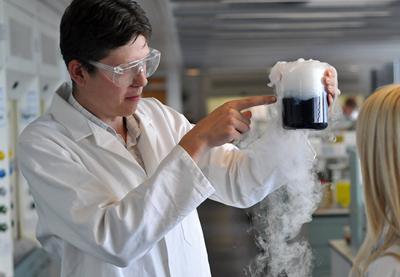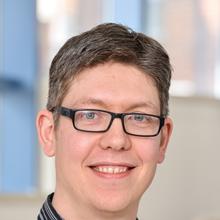Educating tomorrow’s top chemists – with a little help from technology

Initiatives at Chemistry in Southampton are helping young people successfully make the transition from school to university.
School Teacher Fellow Dr David Read has already won national prizes for his work using the latest technologies to aid understanding of advanced scientific concepts.
“It’s always been difficult for teenagers to make the leap from school to university, especially when they are studying the sciences,” he explains. “Far more independent learning is involved and we demand they get to grips with complex theories and concepts. Understanding is key; you can’t get by in higher education by just memorising a list of facts.”
He was one of the first to advocate filming first year lectures and making them available online. This is now becoming accepted as best practice within the sector. “It was controversial to start with as some academics thought attendance would suffer. But that wasn’t the case. Students still value the experience of ‘live’ lectures but they consolidate their learning later by watching some or all of it again,” explains David.
Making lectures available online 24 hours a day has been interesting. “We analyse how they are used and have been surprised to find that more thanfive per cent of viewing takes place between midnight and three am. Other students may watch small parts of lectures, perhaps a particular explanation of an equation or a mechanism several times,” he adds. David is also working on editing the video material into shorter episodes, each of which will focus on a single concept.
Further innovations include using electronic voting pads or ‘zappers’ in the induction process for freshers. Lecturers host brisk revision sessions to challenge the first years on their understanding of Chemistry, offering multiple choice answers and immediate on screen answers; tutor groups compete against each other in this lively learning environment. Zappers are also used at various points throughout the first year to help students to identify their weaknesses and to support them with instant feedback about questions.
David took his BSc and PhD at Bristol. He studied at a university in St Louis, USA, then taught in a secondary school in Reading before joining the University of Southampton in 2007. In 2010, he received the Royal Society of Chemistry Higher Education Teaching Award and the Association for Learning Technology’s Award for Most Effective Use of Video.
The second award was for a novel video-based system to help second years improve their grasp of organic chemistry. The students were asked to self-assess their work with the aid of on screen advice from an academic who explained the marking scheme and highlighted common errors. Feedback included: “I found it very useful. its clearer to see where you’ve gone wrong if you’re marking it yourself rather than having a cross and a wrong answer you see why its wrong” “YES VERY!! please more during the year.” “... It was really good that the videos paused to allow you to add up the marks and stuff.”
David is optimistic about the future of Chemistry and the sciences in general in higher education. “I go into schools a great deal as part of my job and see tremendous enthusiasm. TV shows such as Bang Goes the Theory are making the physical sciences exciting and popularising the subject in the same way that David Attenborough turned a generation into zoologists and biologists.”
